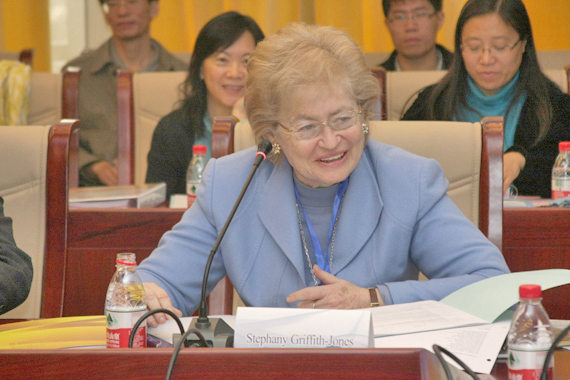Economist optimistic about development bank prospects

Stephany Griffith-Jones is an economist specializing in international finance and development. Currently, she serves as financial markets director at the Initiative for Policy Dialogue at Columbia University and associate fellow at London’s Overseas Development Institute. She has held the position of deputy director of international finance at the Commonwealth Secretariat and has worked at the United Nations Department of Economic and Social Affairs.
On July 21, the New Development Bank BRICS (NDB BRICS, previously known as the BRICS Development Bank) opened in Shanghai, attracting global attention. Economist Stephany Griffith-Jones shared her opinions on the matter with Chinese Social Sciences Today (CSST).
CSST: How would you comment on the location of the NDB BRICS?
Jones: It is a very good idea that the NDB BRICS is based in Shanghai, which is emerging as one of the international financial centers of the world. It helps develop an alternative to Wall Street and the City of London as major financial centers. It will also benefit from the experience of the China Development Bank and China itself. So, it is a good idea in symbolic meaning as well as in substance.
CSST: What factors have contributed to the emergence of the NDB BRICS?
Jones: On an economic level, China and many other Asian countries have massive foreign reserves, savings, as well as an infrastructure financing gap. As estimated by the British economist Nicolas Stern and his colleagues, the gap is as large as $1 trillion a year around the globe. In terms of proportion to GDP, the African countries have the largest gap. In terms of total value, the largest gap is in Asia. So there is a huge gap, and it cannot be filled by existing institutions, public or private.
Developing countries want to have a bigger World Bank, to increase the capital of the bank. Developed countries would only agree to that after being granted more shares. They want to control the veto power and secure their own dominance. The world economy has been changed, but they are still protecting the old, post-World War II order. As suggested by José Antonio Ocampo, the former deputy secretary-general of the UN, there are two ways to transform global governance. One way is to create new institutions. The other is for countries like China or India to carry on the struggle at extant institutions, such as the World Bank and the International Monetary Fund. Current World Bank President Jim Young Kim has been very open and supportive toward the NDB BRICS and the Asian Infrastructure Investment Bank (AIIB). When Kim visited China, he said the two parties will work together. And many major European countries, including Britain, adopted similar gestures. I think it is a positive sign.
CSST: Will the NDB BRICS threaten the role and prestige of the World Bank?
Jones: I do not think NDB BRICS or AIIB will threaten the World Bank, because there is so much to do. After all, there are more than a billion people around the world who do not have electricity at home. I think there will be some healthy competition. If the NDB and the AIIB work well, the World Bank and other banks in developed economies will have to improve their own efficiency.
A lot of complicated issues are involved in the approval of a development program. Take environmental protection as an example. You cannot ask a small African country to be as environmentally concerned as the US, or even China. There should be a balance between development effect, speed and environmental protection.
More importantly, countries should be free to choose the development model they want to follow. In the past, when World Bank implemented programs, it did not show enough respect to the recipient countries. Most of its leaders are from developed economies. They wanted to project their economic models onto other countries. In the 1980s and 90s, they were very ideological. They had the Washington Consensus and wanted everything to be privatized. But now, they are more pragmatic.
What I mean is that countries do not have to copy exactly what China did or what developed economies did, but they need more alternatives. The variety and the competition of ideas are very healthy. China is not perfect, but it has a lot to offer because it has been very successful. The Chinese model is very attractive to many developing countries.
Wang Youran is a reporter at the Chinese Social Sciences Today.
